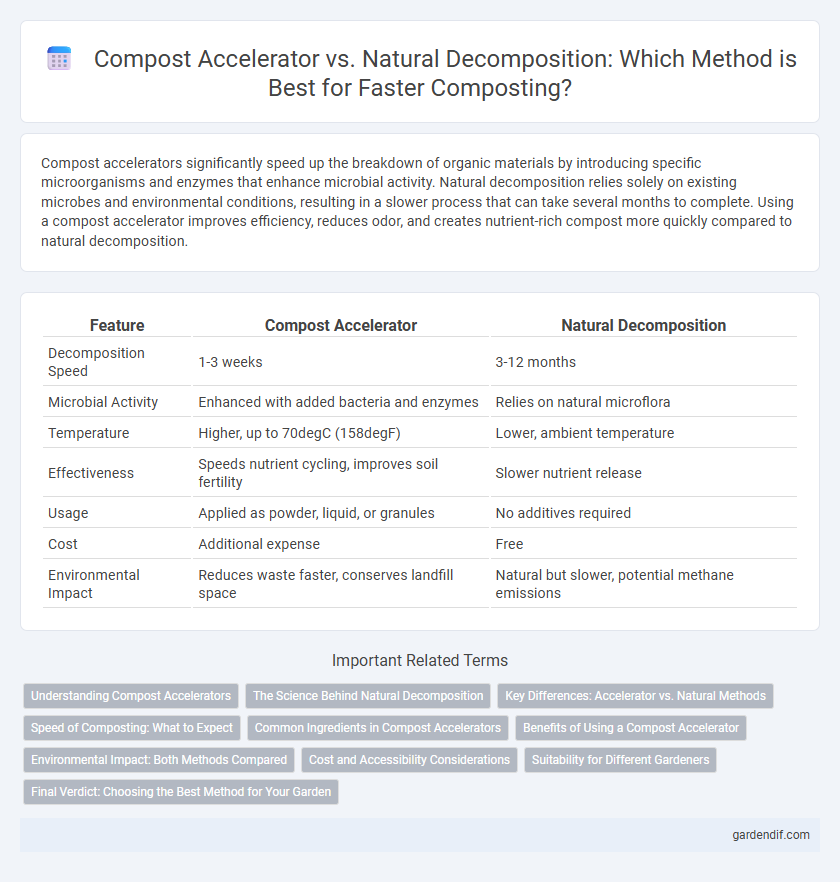
Compost accelerator vs Natural decomposition Illustration
Compost accelerators significantly speed up the breakdown of organic materials by introducing specific microorganisms and enzymes that enhance microbial activity. Natural decomposition relies solely on existing microbes and environmental conditions, resulting in a slower process that can take several months to complete. Using a compost accelerator improves efficiency, reduces odor, and creates nutrient-rich compost more quickly compared to natural decomposition.
Table of Comparison
| Feature | Compost Accelerator | Natural Decomposition |
|---|---|---|
| Decomposition Speed | 1-3 weeks | 3-12 months |
| Microbial Activity | Enhanced with added bacteria and enzymes | Relies on natural microflora |
| Temperature | Higher, up to 70degC (158degF) | Lower, ambient temperature |
| Effectiveness | Speeds nutrient cycling, improves soil fertility | Slower nutrient release |
| Usage | Applied as powder, liquid, or granules | No additives required |
| Cost | Additional expense | Free |
| Environmental Impact | Reduces waste faster, conserves landfill space | Natural but slower, potential methane emissions |
Understanding Compost Accelerators
Compost accelerators contain microorganisms and enzymes that significantly speed up the breakdown of organic matter compared to natural decomposition, which can take months to years. These accelerators optimize the microbial activity by providing essential nutrients and maintaining ideal moisture and temperature levels, resulting in faster nutrient-rich compost production. Understanding the balance and application of compost accelerators enhances soil fertility and waste management efficiency.
The Science Behind Natural Decomposition
Natural decomposition relies on microbial activity, where bacteria, fungi, and other organisms break down organic matter into simpler compounds through enzymatic processes. The science behind this involves aerobic and anaerobic respiration, releasing nutrients like nitrogen, phosphorus, and potassium essential for soil fertility. Unlike compost accelerators that speed up this process by introducing concentrated microbes or enzymes, natural decomposition depends on environmental factors such as temperature, moisture, and oxygen levels to regulate the rate of organic matter breakdown.
Key Differences: Accelerator vs. Natural Methods
Compost accelerators contain concentrated microorganisms and nutrients that speed up organic matter breakdown, reducing decomposition time from months to weeks compared to natural methods. Natural decomposition relies on ambient environmental factors like temperature, moisture, and indigenous microbes, resulting in slower, less predictable composting rates. Using accelerators often leads to higher nutrient retention and more consistent compost quality than traditional natural decomposition.
Speed of Composting: What to Expect
Compost accelerators significantly reduce the speed of composting by introducing beneficial microbes and enzymes that break down organic matter faster than natural decomposition alone. While natural decomposition may take several months to a year depending on environmental conditions, a compost accelerator can shorten this process to just a few weeks. This enhanced microbial activity ensures quicker nutrient cycling and faster soil enrichment.
Common Ingredients in Compost Accelerators
Common ingredients in compost accelerators include nitrogen-rich materials like blood meal and feather meal, phosphorus sources such as rock phosphate, and beneficial microorganisms like Bacillus subtilis to enhance microbial activity. These components significantly speed up the decomposition process compared to natural breakdown, which relies solely on indigenous microbes and environmental factors. By providing a balanced mix of nutrients and microbial inoculants, compost accelerators optimize organic matter transformation into nutrient-rich humus.
Benefits of Using a Compost Accelerator
Using a compost accelerator significantly reduces the time needed for organic waste to break down, transforming materials into nutrient-rich compost faster than natural decomposition. These accelerators contain beneficial microbes and enzymes that enhance microbial activity, improving soil health and plant growth more efficiently. Faster composting also minimizes odor and pest problems commonly associated with slower natural decay processes.
Environmental Impact: Both Methods Compared
Compost accelerators significantly reduce the time required for organic waste to break down compared to natural decomposition, lowering methane emissions from landfill waste. The controlled environment of compost accelerators enhances microbial activity, leading to faster nutrient recycling and reduced greenhouse gases. Natural decomposition, while slower, occurs without added inputs but can release methane anaerobically in unmanaged settings, contributing more to climate change.
Cost and Accessibility Considerations
Compost accelerators reduce decomposition time by enhancing microbial activity, offering a faster, cost-effective alternative to natural composting, which can take several months without intervention. These products are typically affordable and widely accessible at garden centers or online, making them a convenient option for urban gardeners or those with limited space. In contrast, natural decomposition requires minimal upfront costs but demands more time and careful management, which may not be practical for all users.
Suitability for Different Gardeners
Compost accelerators significantly speed up the decomposition process, making them highly suitable for gardeners seeking quick results and those managing limited space or time. Natural decomposition, while slower, is ideal for organic gardeners who prefer low-maintenance, eco-friendly methods that require minimal intervention. Each approach caters to different gardening styles, with accelerators benefiting intensive, fast-paced gardening and natural decomposition aligning with sustainable, low-effort practices.
Final Verdict: Choosing the Best Method for Your Garden
Compost accelerators speed up the breakdown of organic waste by introducing beneficial microbes and enzymes, resulting in nutrient-rich humus within weeks compared to natural decomposition, which can take several months to a year. For gardeners seeking quick, efficient soil enrichment and improved plant growth, compost accelerators provide a reliable solution that optimizes microbial activity and nutrient availability. Natural decomposition remains ideal for low-maintenance, slow nutrient release, but accelerated composting offers significant benefits in terms of time, quality, and garden productivity.
Compost accelerator vs Natural decomposition Infographic

 gardendif.com
gardendif.com